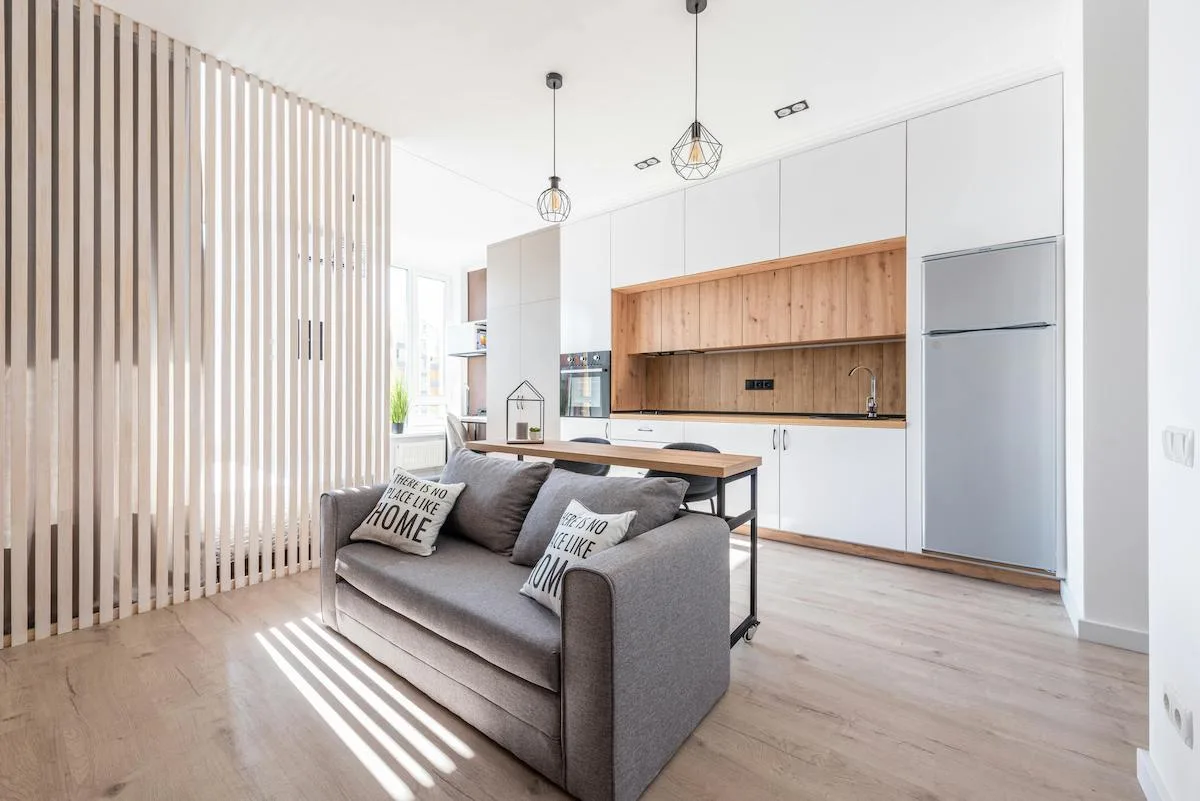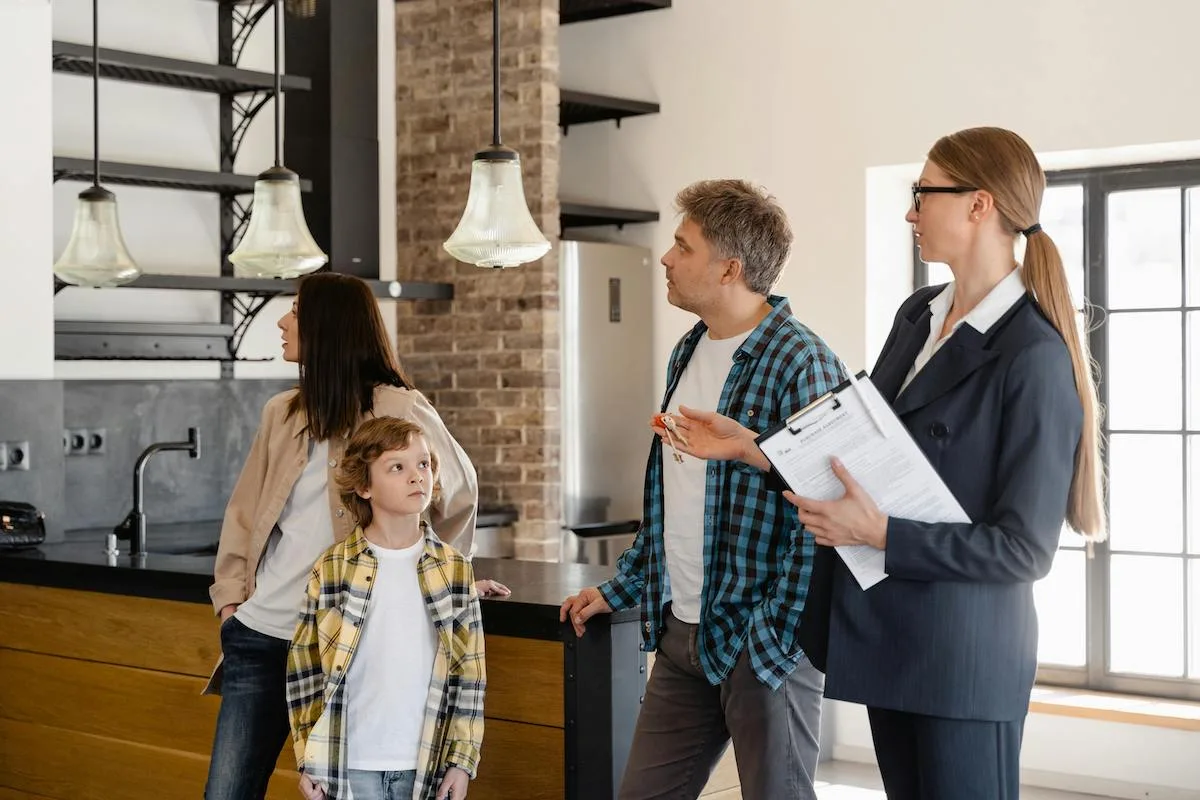The difference between a studio and a 1-bedroom apartment is simple in definition but more nuanced in real life. By definition, a studio apartment is a single open space that combines your living, sleeping, and kitchen areas into one room (with a separate bathroom). A 1-bedroom apartment, on the other hand, has a separate, enclosed bedroom in addition to the main living space.
But the difference in how they feel to live in and which is right for you depends on your budget, lifestyle, and routine. Whether you’re living alone, working from home, or sharing the space with a partner, each layout has trade-offs worth considering.
Here’s what we’ll cover in this Zumper guide:
- The core differences between studios and 1-bedrooms
- Pros and cons of each layout
- Key lifestyle questions to ask yourself
- Hidden listing terms to watch for
- A checklist to help you decide
A studio apartment is more compact and affordable, while a 1-bedroom offers greater separation and comfort, especially for those who live with someone or work from home.
How much space do you really need?
Here’s a general overview of each size:
| Feature | Studio Apartment | 1-Bedroom Apartment |
|---|---|---|
| Layout | One open room (plus a separate bathroom) | Separate bedroom, plus living room and kitchen |
| Privacy | Limited | Good, door separates sleeping area |
| Ideal for | Solo renters, minimalists, people on a budget | Couples, remote workers, renters needing more space |
| Rent | Lower (usually) | Higher (usually) |
| Space efficiency | High (if designed well) | More flexible for furniture, storage, and zoning |
Studio apartments
- Typically fall within the 300-to-600 square feet size range.
- They are best suited for minimalists or renters who don’t spend a lot of time at home.
- They can be easier and cheaper to furnish, clean, and control the climate.
1-bedroom apartments
- Usually 500–800, or more, square feet
- Allow renters to have dedicated spaces for sleeping, working, and relaxing
- Often come with more closets and overall storage.
There are a few variations you might come across when looking at studios and one bedrooms that you should know about, as well:
- “Junior 1-bedroom”: This typically refers to a studio with a partial wall.
- “Convertible 1-bedroom“: This can mean a large studio with room for a divider.
Before deciding on how much space you actually need, be sure to ask yourself a few questions:
- Do I want a physical separation between my work and sleep area?
- Will sharing one space with a partner or pet feel too cramped?
- Do I value simplicity, or do I need room to spread out?
- Have I checked if the layout is actually different, or just labeled differently?

Which is more affordable, a studio or a 1-bedroom?
In most cities, studios are more affordable than 1-bedrooms. Make sure to consider whether saving money is your top priority and if you’re willing to sacrifice space for affordability. Here’s a quick overview:
| Expense Type | Studio | 1-Bedroom |
|---|---|---|
| Rent | ~$200–$600 less per month | More expensive overall |
| Utilities | Lower (less space = less energy) | Higher (more square footage) |
| Furnishing | Fewer items needed | Requires more furniture and décor |
How do you actually use your home?
Ultimately, how you live in your apartment and how you use the space is the most critical factor in how much you need. Are you home all day? Do you host people? Do you need a separate space to focus?
| Scenario | Best Fit | Why |
|---|---|---|
| You work from home full-time | 1-bedroom | Separate office = better focus + work-life balance |
| You live alone and travel often | Studio | Easier upkeep and saves money |
| You live with a partner | 1-bedroom | More privacy, especially for different routines |
| You’re a minimalist | Studio | Efficient layout, lower cost |
| You like to entertain guests | 1-bedroom | More room for visitors without invading your bed |
| You need lots of storage | 1-bedroom | Usually more closets and flexible layout |
In short, you’ll want to reflect on these three questions:
- Do I want a designated space to focus, relax, or sleep?
- How much stuff do I own and will it all fit?
- Do I want to clean, furnish, or heat a larger apartment?
A few distinctions worth noting
As we mentioned earlier, you might come across a few terms related to studios and 1-bedrooms that you should know about before touring an apartment, so you know what to expect.
| Term | What it Usually Means |
|---|---|
| Junior 1-Bedroom | Studio with partial wall or nook—not a legal bedroom |
| Alcove Studio | Studio with recessed sleeping area (L-shape or corner) |
| Convertible 1-Bedroom | Studio with enough space to add a divider |
| Open 1-Bedroom | Studio with no door or wall between bed and living room |
| Loft | Could be a studio or 1-bedroom—usually open concept |
Pros and cons of studio vs. 1-bedroom apartments
Studio pros:
- Potentially lower rent and utility bills
- Easier to clean, furnish, and maintain
- Cozy and efficient
Studio cons:
- No physical separation between sleep, work, and relaxation areas
- Minimal storage space
- Lacks privacy for hosting overnight guests
1-bedroom pros:
- More privacy and distinct functional areas
- Easier to work from home, entertain, or live with a partner
- More storage and flexibility with how you use the space
1-bedroom cons:
- Higher rent and ongoing costs
- More effort, and possibly money, to decorate and clean
- You may need to compromise on location or amenities for the cost
Checklist: Should you rent a studio or a 1-bedroom?
Use this final checklist to help clarify which layout makes more sense for your situation:
- Am I living alone or with someone else?
- Do I work or study from home and need separation?
- Is saving money my top priority?
- Do I need a lot of storage or have bulky furniture?
- Do I enjoy hosting guests or entertaining regularly?
- Would a separate bedroom improve my sleep or stress levels?
- Have I checked the actual layout—not just the listing label?
In summary, which apartment is better for you?
If you’re looking for affordability and efficiency with minimal space, consider a studio.
If you need privacy, flexibility, or room to work, relax, and entertain, choose a 1-bedroom.
Ultimately, the difference between a studio and a 1-bedroom goes beyond square footage. It’s about how well the space supports your daily life, habits, and comfort. Before signing a lease, consider what you need from your home rather than its labels.
Related questions
What is the difference between a studio and a 1-bedroom?
A studio apartment is a single, open space that combines the living, sleeping, and kitchen areas. A 1-bedroom apartment has a separate bedroom enclosed by walls and a door.
Is a studio apartment always cheaper than a 1-bedroom apartment?
The average cost of studio apartments tends to be cheaper than that of 1-bedroom apartments. However, some studios may be cheaper than a 1-bedroom apartment, depending on their amenities, location, and the age of the building.
Is a 1-bedroom worth the extra cost?
A 1-bedroom can be worth it if you need privacy, work from home, have lots of belongings, or plan to live with someone else. If you’re solo and want to save, a studio may offer better value.
What’s a junior 1-bedroom?
A junior 1-bedroom is usually a studio apartment with a partial divider or alcove—without a true enclosed bedroom.
Can a couple live in a studio?
Yes, but it depends on your routines and comfort levels. Couples who work different hours or need personal space may prefer a 1-bedroom.



